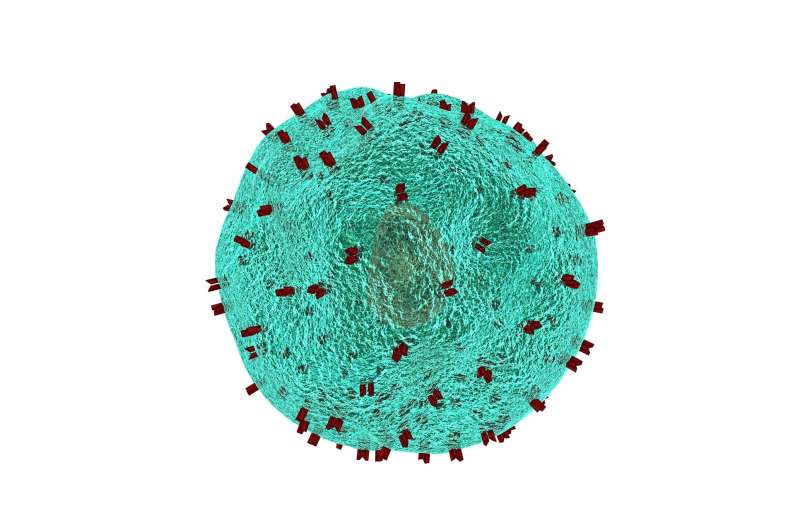Combo T cell and targeted therapy strategy for resistant melanoma with BRAF mutation

Collaborative research by The Wistar Institute and Moffitt Cancer Center has demonstrated that BRAF targeted therapies render resistant melanoma more sensitive to the attack of killer T cells. This result, published online in Clinical Cancer Research, suggests that adoptive T cell therapy may benefit patients that have become resistant to BRAF inhibitors.
Approximately 50% of melanoma patients carry a mutation in the BRAF protein. Targeted therapy with inhibitors of BRAF and the downstream pathway is very effective in these patients, but long-term benefits are limited due to the onset of therapy resistance. Previous studies demonstrated that BRAF inhibitors (BRAFi) positively affect the antitumor immune response mediated by T cells, and a recent small clinical trial has shown positive clinical responses in patients treated with a combination of BRAFi and adoptive T cell therapy, or infusion of tumor infiltrating lymphocytes isolated from the same patient and expanded ex vivo.
"The combinatorial approach of BRAFi and adoptive cell therapy is very promising but the mechanisms mediating this interaction have not been elucidated," said Dmitry I. Gabrilovich, M.D., Ph.D., Christopher M. Davis Professor and program leader of the Immunology, Microenvironment and Metastasis Program at Wistar and a co-corresponding author on the study. "More importantly, we had no proof that this strategy would also benefit patients who have developed resistance to BRAFi therapy."
Research from the Gabrilovich Lab has shown that increased levels of a protein called mannose-6-phosphate receptor (M6PR) are important for the antitumor effects of combination treatment with immunotherapy and chemotherapy or radiation therapy in different mouse models of cancer.
"We asked whether BRAFi could induce the same upregulation of M6PR and whether this effect could be exploited to potentiate the effects of adoptive T cell therapy in BRAFi-resistant tumors, for which clinical options are still very limited," said Amod Sarnaik, M.D., associate member of the Department of Cutaneous Oncology at Moffitt and a co-senior author on the study.
Importantly, M6PR is a receptor for granzyme B, a substance produced by activated CD8+ T cells, and mediates the intake of the toxic cargo released by these killer immune cells.
The team confirmed that BRAF inhibition induces higher expression of M6PR in melanoma cells in culture. Importantly, this effect was also seen in BRAFi-resistant cells. Furthermore, increased expression of M6PR correlated with higher intake of granzyme B and increased sensitivity of melanoma cells to the toxic activity of tumor infiltrating lymphocytes.
The translational relevance of these observations was evaluated in a pilot clinical trial in which 16 patients with metastatic melanoma were treated with the BRAFi vemurafenib followed by adoptive T cell therapy with tumor infiltrating lymphocytes. The combination treatment was well tolerated, and researchers observed that BRAFi caused a marked increase in M6PR in the patients' tumors.
This study suggests that adoptive T cell therapy may be therapeutically useful for patients who experienced tumor progression on BRAFi.
More information: BRAF targeting sensitizes resistant melanoma to cytotoxic T cells, Clinical Cancer Research (2019). Advance online publication.
















